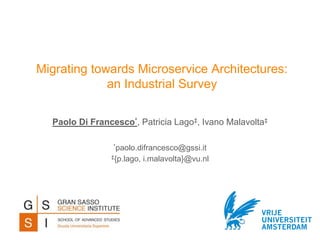
Migrating towards Microservice Architectures: an Industrial Survey
- 1. Migrating towards Microservice Architectures: an Industrial Survey *paolo.difrancesco@gssi.it ‡{p.lago, i.malavolta}@vu.nl Paolo Di Francesco*, Patricia Lago‡, Ivano Malavolta‡
- 2. 2Di Francesco, Lago, Malavolta Paolo Di Francesco Microservice architectures MSA is an architectural style inspired by service-oriented computing • Small services • Running in own process • Lightweight communication Introduction
- 3. 3Di Francesco, Lago, Malavolta Paolo Di Francesco Adopting Microservices Problem: Over time legacy systems grow and become complex • Hard to maintain, high coupling, … • Long time to release feature, low developers’ productivity, … What if we consider migrating to MSA? • Where to begin? • What do we need? • What are the challenges? • What the management will say? • …. Introduction Microservices • Scalability • Agility • Maintainability • Independent releases http://www.brsolutions.com/addressing-business-complexity/
- 4. 4Di Francesco, Lago, Malavolta Paolo Di Francesco Industrial Survey Goal: Characterize the activities and the challenges faced by industrial practitioners when migrating towards MSA Introduction 5 13 #Responses Interviews Questionnaires 18
- 5. 5Di Francesco, Lago, Malavolta Paolo Di Francesco Migrating to Microservices We framed the migration process in the Horseshoe Model1 Introduction ReverseEngineering ForwardEngineering Architecture Transformation 1 R. Kazman et al. Requirements for integrating software architecture and reengineering models: CORUM II Pre-existing System Microservice Architecture Pre-existing Architecture New System
- 6. 6Di Francesco, Lago, Malavolta Paolo Di Francesco Demographic • Roles: architects, CTOs, developers, DevOps engineer, industrial researcher, VP engineer • Monoliths: 17 • Web-based: 13 Results Min Max Avg Experience 5 33 15 Microservices 5 250 59 Duration 9 60 28 Teams* 1 20 6.7 Teams** 1 30 8 People per team* 4 20 8.3 People per team** 2 12 6.5 * Before the migration ** After the migration
- 7. 7Di Francesco, Lago, Malavolta Paolo Di Francesco Migration Activities Migration starts with • New functionalities as MS (10/18) • Existing functionalities as MS (9/18) Microservice adoption • Phased adoption (14/18) Finding: • Migration process • Organized in small increments • May not have a defined-upfront end-point Results “There is no reengineering project or something that is as a single goal of rebuilding the system, we are doing that as part of our daily work.”
- 8. 8Di Francesco, Lago, Malavolta Paolo Di Francesco Migration Activities New features are added during the migration (17/18) Finding: • Agility is a relevant aspect when migrating towards MSA Results “It was like an upgrade of the system, not only a migration. [..] We ended up with an architecture that had better similarities to the actual business.”
- 9. 9Di Francesco, Lago, Malavolta Paolo Di Francesco Migration Activities Pre-existing data is mostly kept ‘as is’ (11/18) Finding: • Data is not being migrated • May hinder • Scalability • Isolation Results Hide Implementation Details Data Decentralization https://www.martinfowler.com/articles/microservices.html#DecentralizedDataManagement
- 10. 10Di Francesco, Lago, Malavolta Paolo Di Francesco Migration Activities Challenges in architecture transformation • High coupling (9/18) • Services boundaries identification (7/18) • System decomposition (6/18) Results Architecture recovery tools?
- 11. 11Di Francesco, Lago, Malavolta Paolo Di Francesco Action Points Practitioners 1. Share your success stories • To kickstart a MSA • To reuse solutions 2. Check business-IT alignment 3. Monitor the development effort and migrate when it grows too much Researchers 1. Address how to migrate pre-existing data to microservices Action Points
- 12. 12Di Francesco, Lago, Malavolta Paolo Di Francesco Conclusions http://www.s2group.cs.vu.nl/icsa-2018-replication-package Conclusions
